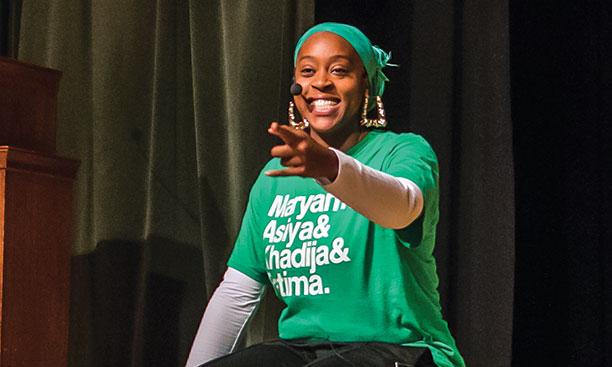
At a time when Muslims in America are fighting damaging stereotypes and increasing marginalization, emphasizing the diversity of the Muslim experience can be a powerful form of resistance. Su’ad Abdul Khabeer *11, an associate professor of anthropology and African American studies at Purdue University, tackles the intersection of music, blackness, and Islam in her book, Muslim Cool: Race, Religion, and Hip Hop in the United States. In the book, as well as in her work as an artist and activist, Khabeer challenges common misconceptions about what it means to be Muslim today.
What is “Muslim cool”?
It’s a term that describes a way of being Muslim in the United States that engages blackness to counter anti-blackness, both as it appears in broader society and in the American Muslim community. “Muslim cool” takes a lot of forms, including in fashion and social activism. For example, I look at a group of men I call “Muslim dandies.” The dandy is a historical figure who’s really self-conscious and meticulous about what he wears, and his dress allows him to transcend class boundaries. By pushing back against the idea of black men as thugs, they’re fighting misconceptions of what it means to be a black man in broader American culture, and they’re also fighting anti-blackness in Muslim communities.
You emphasize the intersection between “black” and “Muslim.” How does this work against stereotypes and social inequalities?
If you look at movements like Black Lives Matter, you see that people in both of these communities — black as well as Muslim — are challenging the status quo, and they’re fighting similar battles. White supremacy works by isolating groups so that marginalized groups see themselves as competitors rather than natural accomplices with one another. I want people in both communities to understand those connections and work together. Highlighting blackness in Islam is critical because black Muslims’ histories are the intersection.
In addition to being a scholar, you’re an artist and an activist. What are some of your upcoming projects?
I have a website called Sapelo Square, an online resource to amplify stories and narratives of black Muslims. I also do a one-woman show called Sampled: Beats of Muslim Life, which allows me to have a different relationship with my audience. I want my performance to teach people to be more critical of their own position — as you learn about stories of Muslims through the show, how does that make you think about the U.S. and your position in your own community? My goal is to promote self-awareness so that viewers can recognize inequalities and identify where they can create change.
Interview conducted and condensed by Amelia Thomson-DeVeaux ’11

